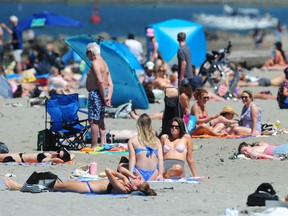Anyone setting up early on Vancouver’s beaches for tonight’s fireworks is advised to prepare for the heat by drinking extra water and seeking shade.

.
Vancouver beaches are expected to be packed today and tonight for the fireworks event.
Announcement 2
.
But viewers who camp early to reserve a spot are urged to come prepared to prevent heat-related illnesses as southern BC continues to be sweltering with a heat wave.
Shortly after noon Wednesday, Paul Runnals, executive producer of the Honda Celebration of Light fireworks festival, said he had already noticed fewer people settling on the beaches, which he ties directly to the heat wave. He said he anticipates more people will arrive at night as temperatures start to drop a bit.
He advises people who are going to see the fireworks show in Canada on Wednesday and the show in Spain on Saturday to take extra precautions before leaving home.
“We’re encouraging people to be aware of the heat and make sure they stay hydrated and seek shelter, and if you’re going down early make sure you’re in the shade from time to time. time to make sure they don’t overheat,” she said.
Announcement 3
.
Temperatures in Metro Vancouver were expected to reach 36 C inland on Wednesday or 29 C closer to the water, however Environment and Climate Change Canada said that with humidity, it could feel closer to 40 C inland and 34 C on the coast. For Saturday’s fireworks, temperatures are expected to be around 26 C and 33 C inland.
Runnals said there is a water wagon set up near the Laughter A-maze-ing statues in Morton Park for refilling water bottles and extra water will be brought in at ticketed events as well. He said that while the event doesn’t have room to build a shelter, there are plenty of trees in the area for cover.
Southern British Columbia is under a heat wave warning, with temperatures above 35C expected from Wednesday to Sunday in parts of the region. A cooling trend will begin after Sunday, according to the warning released early Wednesday by Environment and Climate Change Canada.
Announcement 4
.
Several heat records have been set this week, including Lytton at 40.2C. Pemberton also had unusually high temperatures of 37.1 C on Monday and 39.1 C on Tuesday.
The agency warns that the risks are greatest for young children, pregnant women, older adults, people with chronic illnesses, and people who work or exercise outdoors. Effects of heat illness include swelling, rash, cramps, fainting, heat exhaustion, heat stroke, and worsening of some health conditions.
Metro Vancouver also issued a poor air quality advisory because sunlight is reacting with pollutants to create high concentrations of ground-level ozone east of Vancouver, which can cause breathing difficulties for pregnant people, children, outside workers, or anyone with conditions such as lung disease or asthma.
ad 5
.
Meanwhile, drivers are also being asked to take special care as the number of cars breaking down on the road due to temperatures above 30 C increased this month, according to the BCAA.
Battery replacement calls to BCAAs are up 13 percent since the heat wave began because hot weather is hard on batteries, according to Sara Holland, BCAA’s senior communication manager.
Holland also said the number of cars overheating is up 15 percent from June. Newer vehicles generally don’t overheat, but high temperatures can put a strain on any vehicle, especially older ones, he added.
Modern computer-controlled fans and new types of coolant help when driving in temperatures above 30C, Holland added.
Heat exhaustion can also cause problems for drivers, who may feel dizzy behind the wheel. An ICBC spokesman said the insurance corporation does not track the number of traffic accidents related to heat illness.
ad 6
.
Here are 10 BCAA tips to avoid car breakdowns in the heat:
- Plan your route. Long grades and heavy loads dramatically increase the stress on the motor and increase the risk of overheating. Try to limit heavy trailer towing earlier in the day or later at night when temperatures are cooler. Also, heavy stop-start traffic increases the chance of overheating, so try to find routes without as many stops if possible.
- Have your trusted mechanic check the engine coolant level and concentration and recharge as needed. Check your owner’s manual to find the correct coolant type and strength for your vehicle.
- Make sure the air conditioner is blowing cool air. If not, you may want to have it checked for leaks, or it may require a download.
- Change your oil regularly to help prolong the life of your engine. Check your owner’s manual for recommended service intervals.
- Check the age and strength of the battery. Heat is harder on a tired cell than cold. As a guide, a five-year-old battery is usually nearing retirement.
- Make sure the tires are properly inflated and in good condition. Replace them if they are cracked or have poor tread. Don’t forget the spare.
- Keep the gas tank more than half full. This will keep the fuel cool and will not overload the alternator.
- Use folding sun shades when parked to lower the temperature inside the vehicle.
- Reduce speed on the road. This saves gas and reduces the chance of the engine overheating.
- Be prepared for a breakdown. Bring water, food, a fully charged phone, and some form of portable shade, like a hat or umbrella.
(Source: Chris Bernaerts of BCAA Road Assist)

